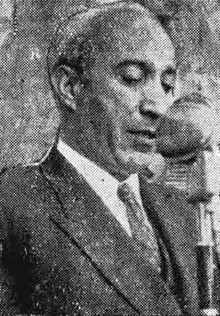Ahmad Razavi
Seyyed Ahmad Razavi (Persian: سید احمد رضوی; 1906–1971) was an Iranian engineer and politician.
Ahmad Razavi | |
|---|---|
 Razavi in 1953 | |
| Member of Parliament | |
| In office 27 April 1952 – 16 August 1953 | |
| Constituency | Kerman |
| In office 12 June 1947 – 28 July 1949 | |
| Constituency | Kerman |
| Personal details | |
| Born | 1906 Kerman, Persia |
| Died | 1971 (aged 64–65) |
| Political party | |
| Other political affiliations | Democrat Party (1946–48) |
Early life and education
Razavi was born in 1906 in Kerman.[1] Hailed from a landed upper-class family, his father headed Shaykhi community in Kerman.[1] He was graduated from the French Lycée in Tehran, before he went to study mineral engineering in France.[2]
Career
Razavi attended the founding meeting of Tudeh Party of Iran in 1941[3] and initially supported the party.[1] He was a co-founder of the Engineers’ Association, and its offshoot Iran Party.[4] In 1946, he joined Democrat Party of Ahmad Qavam, and sided with its radical faction.[1] The next year entered the 15th term of parliament representing his hometown Kerman, and became a well-known deputy after he boldly denounced the armed forces for "inefficiency, corruption, and political meddling".[4]
In 1949, he was among founding members of the National Front.[1] A staunch supporter of Mohammad Mosaddegh, he was elected to the 17th term of parliament as a senior Iran Party member, again from his hometown.[5] During his tenure, he served as the deputy speaker,[6] as well as the head of National Front's parliamentary group.[7]
Exile and death
After the 1953 coup d'état he was arrested and sentenced to life imprisonment, however he was released and permitted to go to exile. He died in 1971.[2]
References
- Abrahamian, Ervand (1982), Iran Between Two Revolutions, Princeton University Press, p. A252, 254, ISBN 0-691-10134-5
- Abrahamian, Ervand (2013), The Coup: 1953, the CIA, and the roots of modern U.S.–Iranian relations, New York: New Press, The, p. xx–xxi, ISBN 978-1-59558-826-5
- Abrahamian, Ervand (1999), Tortured Confessions: Prisons and Public Recantations in Modern Iran, University of California Press, p. 77, ISBN 0520922905
- Abrahamian, Ervand (2013), The Coup: 1953, the CIA, and the roots of modern U.S.–Iranian relations, New York: New Press, The, p. 48, ISBN 978-1-59558-826-5
- Abrahamian, Ervand (2013), The Coup: 1953, the CIA, and the roots of modern U.S.–Iranian relations, New York: New Press, The, p. 133, ISBN 978-1-59558-826-5
- Ansari, Ali M. (2012). The Politics of Nationalism in Modern Iran. Cambridge Middle East Studies. 40. Cambridge University Press. p. 139. ISBN 9780521687171. ISSN 1365-5698.
- "Chronological Summery of Events, 19 February–4 March 1953", Chronology of International Events and Documents, Royal Institute of International Affairs, 9 (5): 150, 1953, JSTOR 40545381
| Party political offices | ||
|---|---|---|
| Unknown Last known title holder: Mohammad Mosaddegh |
Head of the National Movement fraction 1952–1953 |
Vacant |